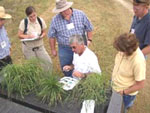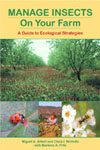|
| |
 
NRCS
provides leadership in a partnership effort to help people conserve, maintain,
and improve our natural resources and environment.
Subscribe to NRCS This Week
|
NRCS This Week Articles Index |
NRCS
This Week Archives |
Contact Us |
Where to Get Information
|
eNotes from
NACD |
Events and Activities |
 TSP Express
(Requires
Adobe Acrobat.) TSP Express
(Requires
Adobe Acrobat.)

 The
"ABC's" of Conservation The
"ABC's" of Conservation
The Beef Cattle Research Station in Butner, North Carolina, was the setting for
an NRCS two-week Basics of Conservation Planning
course that leads students through the nine steps of conservation planning.
 CSP
Takes Root on the Shortgrass Prairie CSP
Takes Root on the Shortgrass Prairie
Working with NRCS, the West Greeley Conservation District, and the Pawnee
Grassland Council -- a group of ranchers who participate in the National
Grassland Grazing Allotment program -- Colby Van Cleave has set up a thriving
cattle operation where once there was only drought-damaged, over-grazed,
cactus-covered pastures in the wind-swept, drought-prone Pawnee Creek watershed
just south of the Nebraska border.
Cooperative Conservation
Ranchers unite to save the land for cattle, wildlife, way of life.
Connect to
NRCS' State
News,
Newsroom, and
News Releases!

 Ag
Air Quality Task Force to Meet in Hawaii Ag
Air Quality Task Force to Meet in Hawaii
The next meeting of the USDA-Agricultural Air Quality Task Force will be
November 13-15, 2005, in Wailea-Maui, Hawaii. The meeting is open to the public
beginning at 8 a.m. for a full day on Sunday, November 13, and on Tuesday,
November 15. Public comments will be accepted each day. The task force
meeting brings attention to the regional nature of ag air quality issues and
Hawaii’s unique concerns of haze and diminished visibility of pristine areas.
This meeting is being held in conjunction with USDA’s Farm Bill Listening Forum,
November 12, in Kona, Hawaii.
Get the details...
--
NRCS news
release “Agricultural Air Quality Task Force to Meet in Hawaii; Open to the
Public on November 13 and 15, 2005” (Nov. 1, 2005)
-- USDA-Agricultural
Air Quality Task Force

 Sustainable
Ag NEtwork (SAN) Announces New Publication on Ecological Strategies to Manage
Insect Pests Sustainable
Ag NEtwork (SAN) Announces New Publication on Ecological Strategies to Manage
Insect Pests
While every farming system is unique, the principles of ecological pest
management apply universally.
Manage Insects on Your
Farm: A Guide to Ecological Strategies, the new title from the
Sustainable Agriculture Research and Education (SARE) program’s outreach arm,
the Sustainable Agriculture Network, provides in-depth look at ecological
strategies that improve a farm's natural defenses and encourage beneficial
insects to attack the worst pests.

 Tidal
Surge Survivors Tidal
Surge Survivors
When Gary Fine, manager of the NRCS Golden Meadow Plant Materials Center
(PMC), was finally able to observe how the PMC’s beach planting sites on several
barrier islands off the coast of Mississippi in the Gulf of Mexico had fared
against Hurricane Rita and Katrina, he was astounded. The plantings had survived
the hurricanes’ tidal surges.
The U.S. Department of Agriculture (USDA) prohibits discrimination in all its programs and activities on the basis of race, color, national origin, sex, religion, age, disability, political beliefs, sexual orientation, or marital or family status. (Not all prohibited bases apply to all programs.) Persons with disabilities who require alternative means for communication of program information (Braille, large print, audiotape, etc.) should contact USDA's TARGET Center at 202-720-2600 (voice and TDD).
To file a complaint of discrimination, write USDA, Director, Office of Civil Rights,
1400and Independence Avenue, SW, Washington, D.C. 20250-9410 or call (800)
795-3272 (voice)
USDA is an equal opportunity provider and employer.
| | |
